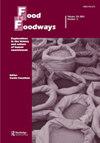食物与肉食:从禁闭到废除
IF 1.1
Q2 ANTHROPOLOGY
引用次数: 3
摘要
监狱空间——例如警察监视的社区区域和剥削在押劳动力的种植园监狱——反映和再现了同样存在于食物系统中的压迫系统。该州经常对贫困进行监管,而不是解决种族资本主义如何使人们无法获得健康食品等基本需求。相反,粮食系统依靠监禁的做法,通过将驱逐出境的可能性武器化,并使用暴力威胁来维持对种族化的无证工人的控制,以确保有纪律的劳工。但也有被监禁的人及其外部盟友为废除刑罚逻辑和制度而斗争的种子。这些措施包括努力改变监狱中的饮食和食品工作,将食物正义重新构想为一场反监禁的社会运动,以及使用绝食等抵抗策略。在这期特刊的导言中,我们将讨论这些联系,并通过以下问题为所有文章奠定基础:食肉性为理论化和理解食物系统、食物文化和食物关系提供了什么?而且,对食物的批判性观察对理解——并最终废除——癌症系统有什么帮助?我们提供理论接触点,将食物正义工作与长期废除监狱组织联系起来,同时介绍该问题中每篇文章的主要主题和贡献。最后,我们反思了我们对食品研究未来的期望。本文章由计算机程序翻译,如有差异,请以英文原文为准。
Food and carcerality: From confinement to abolition
Abstract Carceral spaces—such as neighborhood zones of police surveillance and plantation prisons that exploit incarcerated labor—reflect and reproduce systems of oppression that are also present in the food system. The state regularly polices poverty instead of addressing how racial capitalism perpetuates the lack of access to basic needs like healthy food. Conversely, the food system relies on carceral practices to secure disciplined labor by weaponizing the possibility of deportation and wielding the threat of violence to maintain control over racialized undocumented workers. But there are also seeds of struggle for the abolition of penal logics and institutions by incarcerated people and their allies on the outside. These include efforts to transform eating and food work in prison, reimagine food justice as an anti-carceral social movement, and use resistance tactics like hunger strikes. In this special issue introduction, we address these connections and set the stage for all the articles by asking: What does carcerality offer to theorizing and understanding the food system, food cultures, and food relations? And, what does a critical look at food offer toward understanding—and eventually abolishing—carceral systems? We offer theoretical touch points that connect food justice work to long-standing prison abolition organizing while introducing the major themes and contributions of each article included in the issue. We end with a reflection on our aspirations for the future of food studies.
求助全文
通过发布文献求助,成功后即可免费获取论文全文。
去求助
来源期刊

Food and Foodways
ANTHROPOLOGY-
CiteScore
2.20
自引率
0.00%
发文量
16
期刊介绍:
Food and Foodways is a refereed, interdisciplinary, and international journal devoted to publishing original scholarly articles on the history and culture of human nourishment. By reflecting on the role food plays in human relations, this unique journal explores the powerful but often subtle ways in which food has shaped, and shapes, our lives socially, economically, politically, mentally, nutritionally, and morally. Because food is a pervasive social phenomenon, it cannot be approached by any one discipline. We encourage articles that engage dialogue, debate, and exchange across disciplines.
 求助内容:
求助内容: 应助结果提醒方式:
应助结果提醒方式:


